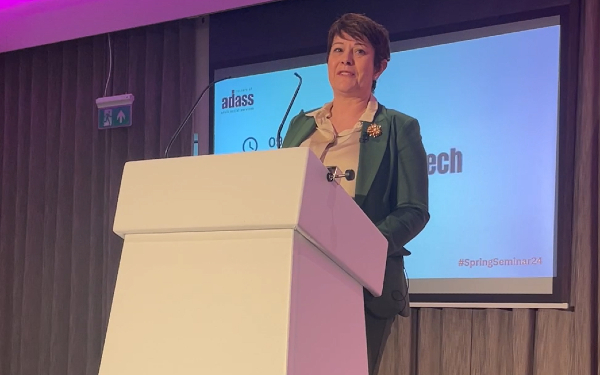
The next government should take forward reform of the Mental Health Act 1983 (MHA) and implementation of the Liberty Protection Safeguards (LPS) in its first 100 days in office, the incoming Association of Directors of Adult Social Services (ADASS) president has said.
However, Melanie Williams said she was not expecting either major party to implement the cap on care costs and associated reforms to the adult social care charging system should they win the next election.
Williams took over as ADASS president from Beverley Tarka at its annual spring seminar last week, meaning she will see the association through and beyond the election, which is widely expected to take place by November 2024.
MHA reform, the replacement of the Deprivation of Liberty Safeguards (DoLS) with the LPS and the introduction of the charging reforms are three policies that the current government has pledged to introduce but that will not be implemented before the election.
Leftover social care reforms
- MHA reform: this would reform the 1983 act to lower the thresholds for detention in hospital and community treatment orders and exclude autistic people and people with learning disabilities from being detained for treatment without a co-existing mental health condition. However, despite publishing draft legislation in 2022, the government has not come forward with a full bill to enact the changes. Labour has said it will take forward the reform, if elected.
- LPS: this would create a new, more streamlined way of authorising care or treatment arrangements that deprive a person of liberty where they are unable to consent, replacing the DoLS, for care homes and hospitals, and Court of Protection welfare orders to cover other settings. However, last year, the government said it would not be implemented until after the election. Labour’s position on the reform is unclear.
- Adult social care charging reform: this would put an £86,000 cap on how people’s lifetime expenditure on their personal care and raise the asset threshold above which people are ineligible for state-funded care, from £23,250 to £100,000. Originally due for implementation in October 2023, the government announced a two-year delay in 2022. Since then, the government has not announced any steps towards implementation in 2025. Labour has said it remains committed to it but has not set out how it would pay for it.
Cap on care costs ‘too politically risky’
In an interview with Community Care, Williams said see could not see the next government – whether Conservative or Labour – implementing the adult social care charging reforms “because of the price tag” and the fact that it was “too politically risky”.
The current government allocated £3.6bn over three years to the changes, but then reallocated this money to fund day-to-day adult social care services. While Labour’s shadow care minister, Andrew Gwynne, told last week’s spring seminar that Labour remained committed to the reform, the party has not set out how it will pay for it within the constraints of its tight fiscal policy.
In her speech to the spring seminar, Williams referenced repeated past promises from politicians to reform adult social care that failed to come to fruition.
“Politicians make promises about reforming social care and then don’t fulfil them,” she said. “To build sustained political backing to transform care and support in England, we not only need the trust of decision-makers in Government and their confidence that the solutions we’re proposing will work. We need to the change the way the public thinks about social care.”
MHA reform and LPS ‘priority for new government’
However, she was clear that MHA reform and the LPS should be an early priority for the next government.
“In the first 100 days of a new minister, one of the things I’d like them to do is implement Mental Health Act reform and Liberty Protection Safeguards,” she told Community Care.
The LPS is designed to tackle councils’ substantial backlogs of DoLS cases, which mean that many thousands of people are likely being deprived of their liberty unlawfully.
And reform to the MHA has the objectives of reducing the number of people subject to compulsory treatment, tackling the disproportionate use of the act in relation to black people and preventing the detention of people simply on the grounds of autism or learning disability.
“They’re really important [reforms] and make a real difference to people’s lives, particularly Mental Health Act reform because it tackles [issues such as] people with autism admitted to hospitals.”
Background in youth work
Williams has been director of adult social care and health at Nottinghamshire council since 2019, having previously held management roles across various councils, mental health charities and the NHS, after having started her career in care work and youth work.
“I felt quite troubled as a teenager and the youth worker I had was really important so that’s what got me into it because I wanted to give something back,” she said.
“And then I met a friend who worked in social care full-time, so she said, ‘why don’t you give it a go full-time?’. So, it was a very accidental start to the career. And then I just started progressing through management. I’m not sure how I did it. There was no secret or formula.”
Tribute to predecessor

Beverley Tarka, ADASS president, 2023-24
Williams paid tribute to her predecessor in her speech to the spring seminar, saying she was “an inspiration for inclusive leadership and has set an expectation for ADASS for how we will work into the future, which I fully intend to mirror”.
She then referenced the results of the social care workforce race equality standard (SC-WRES), assessing the performance of 23 councils against a series of race equality measures.
‘Shock, anger and shame’ at workforce race inequality
It found that black, Asian and minority ethnic social care staff faced disproportionately high levels of workplace bullying, disciplinary action and fitness to practise referrals, while also being less likely than white counterparts to be appointed to jobs from shortlists.
“Reading the recent report on learning from the SC-WRES was an emotional rollercoaster for me through shock, anger, shame and then a determination to act,” she said. “These experiences within our own workforce are simply not good enough.”
Nottinghamshire was one of the councils to take part and Williams told Community Care she would like to see the SC-WRES rolled out nationally and also applied to other protected characteristics beyond race.
She also referenced Tarka’s championing of the role of informal carers, through her carers’ challenge, designed to identify good practice with the group.
“Carers will remain a priority for us,” she told the spring seminar “91% of directors stated in the spring survey that unpaid carers are coming forward with an increased level of need. That carer burnout is the main driver of family breakdown. Enabling carers to care through carers leave, support when it is needed most, and navigating our systems with digitally enabled access, are core to our priorities this coming year.”





 Recognising and responding to shame in child protection: key practice points
Recognising and responding to shame in child protection: key practice points  Assistive technology and dementia: practice tips
Assistive technology and dementia: practice tips 




 Find out how to develop your emotional resilience with our free downloadable guide
Find out how to develop your emotional resilience with our free downloadable guide  Develop your social work career with Community Care’s Careers and Training Guide
Develop your social work career with Community Care’s Careers and Training Guide  ‘Dear Sajid Javid: please end the inappropriate detention of autistic people and those with learning disabilities’
‘Dear Sajid Javid: please end the inappropriate detention of autistic people and those with learning disabilities’ Ofsted calls for power to scrutinise children’s home groups
Ofsted calls for power to scrutinise children’s home groups Seven in eight commissioners paying below ‘minimum rate for home care’
Seven in eight commissioners paying below ‘minimum rate for home care’
 Facebook
Facebook X
X LinkedIn
LinkedIn Instagram
Instagram
No comments yet.